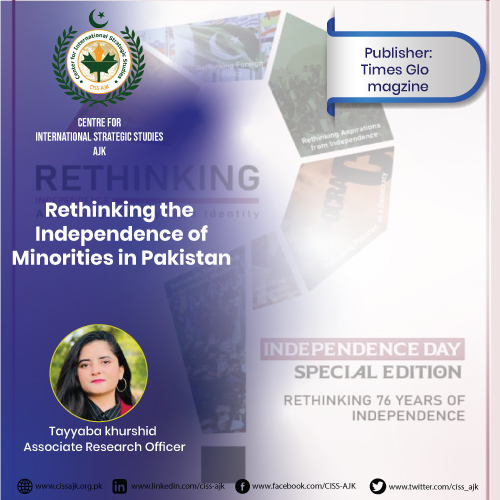711
Pakistan was created as an Islamic
Republic with a demography comprising of both Majority Muslims
(96.2%) and Minorities, which
include Christians (1.59%), Sikhs,
Hindus (1.6%), Ahmadis (0.22%),
and others (0.07%). Minorities or
others account for almost 3.8 % of
the total population, as per the
2017 Census. Celebrating the 76th
year of independence, it is essential to analyze the independence
of minorities in terms of religious
freedom, equal opportunities, and
constitutional rights in Pakistan.
The father of the Nation had set
the ground for the future trajectory of Pakistan in the very beginning when, in his address to the
Constituent Assembly on August
11, 1947, he reiterated, “You are free;
you are free to go to your temples,
you are free to go to your mosques
or any other places of worship in
this State of Pakistan.” “You may
belong to any religion or caste or
creed — that has nothing to do
with the business of the state.”
The constitution of Pakistan also
grants equal rights to minorities.
Article 20 allows all citizens to practice religion and manage their
religious institutions. Article 25
states that all citizens of Pakistan
are equal before the law. Article 36
of the Constitution has obliged the
state to protect the interests and
legitimate rights of minorities in Pakistan, including their fair representation in federal and provincial services. Hence, measures should be taken
to implement these laws and create a conducive, non-discriminatory environment for all
citizens.
Despite Quaid’s direction, laws, and various governments’ initiatives to create inter-faith harmony,
incidents of targeting minorities have been on the
rise. An unfortunate incident took place this month
when all Pakistanis were celebrating Independence
Day; an extremist mob targeted the Christian community by vandalizing their churches and burning
houses on issues of Blasphemy in Jaranwala, a small
town in the industrial district of Faisalabad. In
December 2021, his fellow workers killed and
burned a Sri Lankan manager. In another incident
at the police station in Nankana Sahib, a mob forcefully took a person and killed and dragged his body.
In August 2021, when a local court in Rahim Yar
Khan District granted bail to an eight-year-old
Hindu boy accused of Blasphemy, a mob of extremist people vandalized a Hindu temple.
Pakistan’s minorities endure persecution, marginalization, and forced conversions. Misused blasphemy
laws have led to violence, including attacks on worship places. Despite equal rights in law, violence is
sternly addressed. The recent Jaranwala incident
drew widespread condemnation, with the caretaker
PM vowing robust action. Law enforcement is pursuing culprits, arresting dozens. While equality is
upheld, preventive policies are essential to avert
such incidents.



